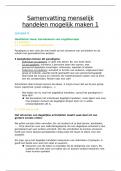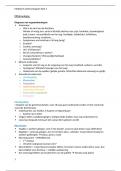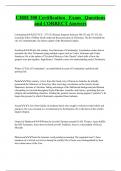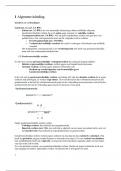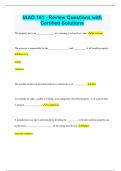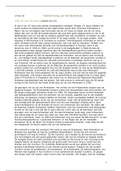Exam Preparation
Module 1-12
Week 1 - Introduction
Substantive criminal law
Procedural criminal law
Comparative criminal law:
Functions of criminal law:
Punishment:
Criminal liability:
Jurisdiction and criminal law:
Week 2 - The Legality Principle
The Legality Principle
Week 3 - Mens Rea and Actus Reus
Mens Rea
Actus Reus
The bipartite and tripartite system:
Week 4 - Defenses
Justifications
Excuses
Week 5 - Criminalization
Five principles of criminalization:
Week 6 - Sentencing
Goals of punishment:
Types of sanctions:
Module 7+8 - Criminal Procedure
Different legal families:
Models of procedural law
Lay participation
Criminal charge
Defendant’s rights
Unwritten limitation clauses
Module 9 - Interrogation and Torture
Torture
Interrogation
Interrogational torture
Module 10 - International War Crimes
1
, Elements of international crimes
War crimes
International Criminal Court
Type of war crimes
Module 11 - Liability Modes and Defenses
Liability modes
I. Perpetrators → principals
II. Accessories
III. Command/superior responsibility (special form of liability)
Defenses
Module 12 - Victimology
Risks of victimization:
Ideal victim
Victims’ experiences
Role of the victim
Victim’s rights
Exam
Structure
Midterm answer tips
Week 1 - Introduction
● Substantive criminal law
○ body of law that determines how someone should behave, which behaviour is
criminal, and is used to govern and regulate criminal acts. This category focuses
on the primary conditions of criminal liability and the protection of legal interests.
○ “Mala in se” and “mala prohibita”
■ Mala in se → inherent wrongs, things that are wrong, independent of
regulations, crimes that are universally recognized as evil
■ Mala prohibita → prohibited wrongs, unlawful, use of drugs, prostitution,
firearms, do not necessarily mean crimes against humanity but more or
less a crime against society
● Procedural criminal law
○ the formal steps that must be taken to enforce substantive criminal law.
Incorporates rules that regulate the investigation, trial, and appeal.
● Main sources of criminal law:
○ Criminal codes
○ Acts of Parliament/statutes
○ Case law
○ Treaties and international regulations
2
, ○ Doctrines (influences how concepts are interpreted)
○ General principles of law (abstract norms that refer to fundamental values)
● Comparative criminal law:
○ Legal families:
■ Common law → case law based systems, criminal law is developed from
jurisprudence and judicial reasoning, inductive and result-oriented
■ Civil law → codified law and statutory rules, more concept-driven and no
precedent case law (stare decisis)
○ Criminal courts:
■ National level:
● Lower courts (courts of first instance) → this court convict or
acquits the defendant
● Courts of appeal → to file an appeal against the judgment
● Supreme courts → when the judge or prosecutor disagrees with
the appealed decision
■ Human rights courts → to protect human rights and promote the Rule of
Law
■ International courts → ICJ and Criminal Tribunals
● Functions of criminal law:
○ Aim: To maintain and restore order in society and to prevent lynch law. To protect
society from harmful and dangerous human behaviour
○ Declaratory function: to declare the importance of certain norms and values in
society and impose sanctions for violating those norms.
○ Preventive function: imposing sanctions for violating certain norms will prevent
potential crimes from being committed
○ Censuring function: conveys society’s censure and disapproval of certain acts
and behaviour
● Punishment:
○ Theories of punishment:
■ Retributive → those who commit a crime deserve to be punished when
you inflict harm on society, society can inflict harm back to you,
punishment is moral vengeance and fulfils the personal need for revenge
● Who?
○ Anyone who freely committed a crime
● Why?
○ Absolute theory → punishment should be imposed
regardless of the goals/effects that can be persued in
terms of prevention
● How severe?
○ Proportional to the seriousness of the offence and
culpability of the offender
○ Positive theory of retribution → a crime should be repaid in
full to the seriousness of the crime
3
Module 1-12
Week 1 - Introduction
Substantive criminal law
Procedural criminal law
Comparative criminal law:
Functions of criminal law:
Punishment:
Criminal liability:
Jurisdiction and criminal law:
Week 2 - The Legality Principle
The Legality Principle
Week 3 - Mens Rea and Actus Reus
Mens Rea
Actus Reus
The bipartite and tripartite system:
Week 4 - Defenses
Justifications
Excuses
Week 5 - Criminalization
Five principles of criminalization:
Week 6 - Sentencing
Goals of punishment:
Types of sanctions:
Module 7+8 - Criminal Procedure
Different legal families:
Models of procedural law
Lay participation
Criminal charge
Defendant’s rights
Unwritten limitation clauses
Module 9 - Interrogation and Torture
Torture
Interrogation
Interrogational torture
Module 10 - International War Crimes
1
, Elements of international crimes
War crimes
International Criminal Court
Type of war crimes
Module 11 - Liability Modes and Defenses
Liability modes
I. Perpetrators → principals
II. Accessories
III. Command/superior responsibility (special form of liability)
Defenses
Module 12 - Victimology
Risks of victimization:
Ideal victim
Victims’ experiences
Role of the victim
Victim’s rights
Exam
Structure
Midterm answer tips
Week 1 - Introduction
● Substantive criminal law
○ body of law that determines how someone should behave, which behaviour is
criminal, and is used to govern and regulate criminal acts. This category focuses
on the primary conditions of criminal liability and the protection of legal interests.
○ “Mala in se” and “mala prohibita”
■ Mala in se → inherent wrongs, things that are wrong, independent of
regulations, crimes that are universally recognized as evil
■ Mala prohibita → prohibited wrongs, unlawful, use of drugs, prostitution,
firearms, do not necessarily mean crimes against humanity but more or
less a crime against society
● Procedural criminal law
○ the formal steps that must be taken to enforce substantive criminal law.
Incorporates rules that regulate the investigation, trial, and appeal.
● Main sources of criminal law:
○ Criminal codes
○ Acts of Parliament/statutes
○ Case law
○ Treaties and international regulations
2
, ○ Doctrines (influences how concepts are interpreted)
○ General principles of law (abstract norms that refer to fundamental values)
● Comparative criminal law:
○ Legal families:
■ Common law → case law based systems, criminal law is developed from
jurisprudence and judicial reasoning, inductive and result-oriented
■ Civil law → codified law and statutory rules, more concept-driven and no
precedent case law (stare decisis)
○ Criminal courts:
■ National level:
● Lower courts (courts of first instance) → this court convict or
acquits the defendant
● Courts of appeal → to file an appeal against the judgment
● Supreme courts → when the judge or prosecutor disagrees with
the appealed decision
■ Human rights courts → to protect human rights and promote the Rule of
Law
■ International courts → ICJ and Criminal Tribunals
● Functions of criminal law:
○ Aim: To maintain and restore order in society and to prevent lynch law. To protect
society from harmful and dangerous human behaviour
○ Declaratory function: to declare the importance of certain norms and values in
society and impose sanctions for violating those norms.
○ Preventive function: imposing sanctions for violating certain norms will prevent
potential crimes from being committed
○ Censuring function: conveys society’s censure and disapproval of certain acts
and behaviour
● Punishment:
○ Theories of punishment:
■ Retributive → those who commit a crime deserve to be punished when
you inflict harm on society, society can inflict harm back to you,
punishment is moral vengeance and fulfils the personal need for revenge
● Who?
○ Anyone who freely committed a crime
● Why?
○ Absolute theory → punishment should be imposed
regardless of the goals/effects that can be persued in
terms of prevention
● How severe?
○ Proportional to the seriousness of the offence and
culpability of the offender
○ Positive theory of retribution → a crime should be repaid in
full to the seriousness of the crime
3



